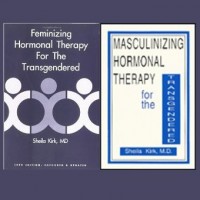Review of Sheila Kirk, Hormones (1991)

©1991, 2013 by Dallas Denny
Source: Dallas Denny (as Hilga Henson). (1991, Summer). Review of Sheila Kirk, Hormones. Chrysalis Quarterly, 1(2), pp. 32-33. Reprinted in 1992 in TV Connection, 2(4), 20.
Sheila Kirk. (1991). Hormones. Wayland, MA: International Foundation for Gender Education.
Dr. Kirk’s little book about hormones has been eagerly awaited by many in the gender community. I ordered my copy as soon as I got my notice from IFGE that it was in print. I regret to say I was disappointed. I learned little from the book, but perhaps that is because my idea of a good time is haunting the stacks in the medical library at Vanderbilt University. Those who want an introduction to the use of counter-sex hormones will probably find it useful.
As a gynecologist, Dr. Kirk has years of experience in prescribing estrogens and progestins to genetic females, and as IFE’s on-board physician, she doubtless has experience in prescribing them for genetic males. She knows what she is talking about—she just doesn’t say enough. She does not include references, and does not go into enough detail about the positive and negative effects of hormones to give the book much bang for the buck. Let’s face it; you’ll find lots more information on the little piece of paper the pharmacist puts in the bottle with your prescription.
To her credit, Dr. Kirk prefaces the work with a disclaimer, warning those who take hormones to do so only with proper medical supervision. She does not, however, delve into issues of who should and should no take hormones. This is unfortunate, for the gender community is full of people who have absolutely no business taking them.
For years, feminists have been claiming that estrogens are widely over-prescribed by physicians, and that their dangers are minimized because it is typically women and not men who receive them. Dr. Kirk unfortunately subscribes to the mainstream medical philosophy. The fact is that hormones are not nearly so benign as Dr. Kirk and other physicians would lead us to believe. For example, males treated with estrogens for prostatic cancer have shown an increased rate of cardiovascular events (Henriksson & Eedhag, 1986) and mortality (Glaashan & Robinson, 1981). Transsexual males on estrogen and cyproterone acetate (an antiandrogen) showed thromboembolic events, hyperprolactinemia, and depressive mood changes at rates many times greater than chance indicated (Asscheman, Gooren, & Eklund, 1989).
Absence of evidence is not evidence of absence. Hormones undoubtedly do pose significant health risks. The studies which would clearly show those health risks have, unfortunately, not been done. But remember—until a few decades ago, studies had not conclusively shown the health risks of cigarette smoking.
What Dr. Kirk wrote is quite good. Unfortunately, she quit writing far too soon.
Asscheman, H., Gooren, I.J., & Eklund, P.I. (1989). Mortality and morbidity in transsexual patients with cross-gender hormone treatment. Metabolism: Clinical and Experimental, 38(9), 869-873. Glashan, R.W., & Robinson, M.R.G. (1981). Cardiovascular complications in the treatment of prostatic carcinoma. British Journal of Urology, 53, 624-627. Henrikkson, P., & Edhag, O. (1986). Orchidectomy versus oestrogens for prostatic cancer: Cardiovascular effects. British Medical Journal, 293, 413-415.
Dr. Kirk’s book has been much needed, for it is the first to deal specifically with the important and sometimes controversial issue of hormones for transgendered persons. Its viewpoint is sympathetic, yet objective, for it is written for consumers by someone who is both a physician and a consumer. It is not a dry textbook by someone who has met transgendered persons only in a clinical setting, nor an enthusiastic endorsement by an estrogen-crazed crossdresser, but a simple exploration of the realities of hormonal therapy.
Those looking for a justification for taking hormones will not find it here. In fact, Dr. Kirk neatly, and probably wisely, sidesteps the issue by not even bringing it up. She simply explains what hormones are, which hormones are available and in which form, and what they will and will not do. She leaves the decision (which warrants a book in itself) to the individual and his or her therapist.
Hormones are not without their dangers, and Dr. Kirk does not pull any punches when explaining how they can interfere with normal body functioning. Neither do they make magical changes to the body; Dr. Kirk succinctly and accurately points out what they will and will not do. She provides the individual who is considering hormonal therapy with a realistic notion of what will and will not occur, and she provides those who are foolish enough to be self-administering hormones with enough information to hopefully keep them from damaging or killing themselves.
To her credit, Dr. Kirk includes discussion of both male and female hormones. Too many of the publications of our community exclude the new men, who, it would now seem, exist in equal numbers to new women. She also discusses anti-androgens, which are finally available in this country and seem to be coming into increasing favor by endocrinologists.
Hormones is small, easy to carry in a purse or pocket on a visit to the endocrinologist. I have the first edition, which suffered from some problems with layout (some headings are at the bottom of the page, with the following text at the top of the next), but a second, revised, edition has been printed, probably with those problems corrected. At less than ten dollars, it is a bargain. Those who take hormones should certainly have it, and those who are seriously contemplating hormonal therapy should buy it and read it twice.
